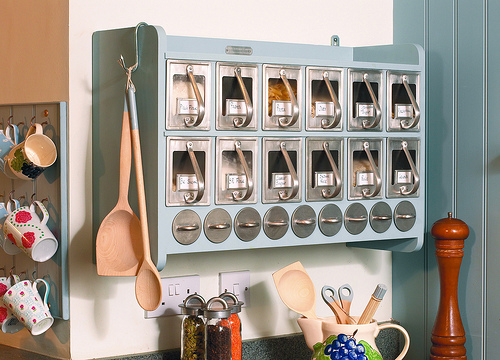Store Food Right!
 Growing and storing your own food is an excellent way to cut food costs and enjoy the bounty of spring and summer in the fall and winter, when your options might feel grim. Stocking up on meats, grains, and other supplies from the store can also be a great idea, ensuring that food is available when you need it, whether you're preparing for heavy weather that might make it hard to get to the store or a period of time when you know you'll be deep into work and other projects at home, and unwilling to head out for supplies.
Growing and storing your own food is an excellent way to cut food costs and enjoy the bounty of spring and summer in the fall and winter, when your options might feel grim. Stocking up on meats, grains, and other supplies from the store can also be a great idea, ensuring that food is available when you need it, whether you're preparing for heavy weather that might make it hard to get to the store or a period of time when you know you'll be deep into work and other projects at home, and unwilling to head out for supplies.
But it's important to make sure that your stored food is safe. Food safety is critical to prevent serious and potentially life-threatening illnesses, in addition to the more run of the mill tummy aches and discomfort. Before you set up a food storage system, plan ahead to anticipate basic safety needs, and make sure all the residents of the house are acquainted with how to keep food safe.
General Advice
It's a good idea to keep food in a cool, dry, dark place. Coolness can prevent the growth of harmful bacteria and it also limits heat damage, which can reduce the flavor of the food in addition to discoloring it. Dryness is critical to prevent mold, bacterial, and other organisms from settling in, while darkness is recommended because many organisms need light to survive...and because light can weaken containers, creating entry points for unfriendly visitors. Furthermore, it leads to nutrient loss.
Consider talking to your contractor about building a cold pantry or food storage area in the basement for optimal conditions. If you have leaks or other moisture problems, your Dallas plumber should take a look at the situation.
Freshness is an issue. Keep track of expiration dates, use older food first, and eat what you store. Don't buy foods you won't eat in the optimistic hope that you'll start, because they'll molder away on the shelf. Consider goods that last a long time, such as dried or canned beans and fruit in addition to dried nuts. Be aware that flours and grains can host weevils and other small organisms if they're allowed to sit too long, so inspect older but theoreticaly unexpired food to confirm it's safe to eat.
Freeze-dried and dehydrated foods have an extremely long shelf life. Some are quite flavorful and delicious, so try getting small amounts and experimenting to find what you like. Fresh foods, including meat, produce, and dairy, have very short shelf lives and often need to be refrigerated. Think about what you might do if these foods weren't available in fresh form, and consider alternatives.
Canned Foods
Whether in a jar or a tin can, canned foods can and do go bad, in addition to expiring. Obvious warning signs that food is not safe to eat include rust or other marks of corrosion on lids or containers, holes in the container, bulging, or dents. Acidic foods last longer, up to 18 months, but don't assume food is safe just because it's within the safety margin. If it looks or smells off, don't eat it.
Canned foods need to be stored in a cool, dry, dark place, ideally with temperatures between 50 and 70 degrees Fahrenheit. Temperatures above 70 and below freezing are dangerous.
Dried Foods
The biggest enemy with dried food is moisture. By following the general guidelines above, you can keep basic dried foods safe for six months to a year. Be aware that once a container or bag is opened, the clock starts ticking, and you need to start thinking about how you're going to use your food. If you buy dried foods like beans and grains in bulk, storage bins can become breeding grounds for bacteria and other organisms. Consider packaging smaller amounts in airtight bags (tough vacuum-sealed bags are a great idea) so you can expose a limited amount to the environment at any given time. Glass and metal containers work well for long-term storage if they have tight seals, as they'll keep moisture, microorganisms, and visitors like rats out.
Smoked and Cured Foods
Historically, some foods were very heavily smoked, salted, and cured for the purpose of long-term storage. We still retain a taste for cured foods, but the modern versions are often much milder, which means they don't last as long. Smoked salmon, for example, often requires refrigeration, while meat jerkeys aren't designed to last forever. If you're buying such foods, check their expiration dates carefully, and if you're making them yourself, make sure you use methods intended for long-term storage, not short-term enjoyment.
The important rule of thumb with food storage is to avoid eating foods that are obviously damaged. If you do get sick, make sure to tell your doctor about what you've eaten in the last 36-48 hours. The cause of your illness not necessarily have been what you ate, but this information can help your doctor determine the cause and get you the treatment you need as quickly as possible.
Katie Marks writes for Networx.com.
Looking for a Pro? Call us (866) 441-6648

Landscaping Average Costs
Landscapers Experiences

Seamless Extension Of Concrete Patio And Poolside Retaining Wall

New Stairs And Roof Installation Are The Perfect Deck Upgrade



